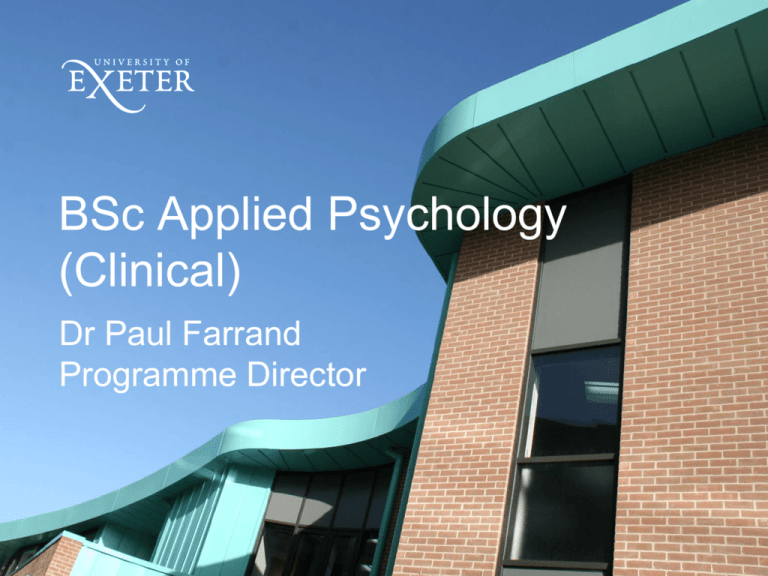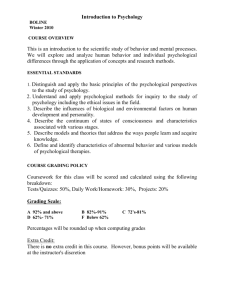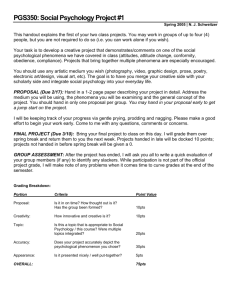BSc Applied Psychology (Clinical)
advertisement

BSc Applied Psychology (Clinical) Dr Paul Farrand Programme Director BSc Applied Psychology (Clinical) at Exeter • 10th in the UK for Psychology • Excellent teaching quality – 90% for Overall Satisfaction in National Student Survey 2011 • Internationally rated research (RAE 2008) – 11th in UK for world leading research Teaching Facilities • Resources of specialist clinical training group (CEDAR) with national reputation • Clinical skills training suites with full audio/visual recording capacity • State-of-the-art computer laboratories • Specialist practical laboratories Teaching Expertise • International expertise in translating research evidence into training and intervention development – CBT Mindfulness (Professor Kuyken) – Rumination (Professor Watkins) – Low Intensity CBT (Professor Richards, Dr Farrand) • Nationally recognised clinical training expertise – Dr Farrand nominated for National Teaching Fellowship • Clinically active staff • Research on clinical training methods incorporated into programmes Teaching Delivery • Full range of teaching and assessment methods used: • Simulated competency assessments with actors (Richards, D & Whyte, M., 2008). • Problem Based Learning (Stedman, J., Wood, J., Curle, C. & Haslam, C, 2005). • Self-Practice/Self-Reflection to support training in CBT (Haarhoff, B. & Farrand, P., 2012). • Reflective blogs to support Self-Practice/SelfReflection (Farrand, P., Perry, J., Linsley, S., 2010). Teaching Delivery • Nationally recognised centre of excellence for training Psychological Wellbeing Practitioners. • Dedicated Psychological Wellbeing Practitioner Clinical Educator team. Research Facilities • Mood Disorders Centre: internationally recognised specialist research group • Specialist facilities including: – access to fMRI imaging and psychophysiological labs – group research treatment rooms – clinical labs Clinical Facilities • AccEPT Clinic: psychological therapies service offering access to psychological treatments under development • Provides research placement opportunities • Enables academic staff to retain clinical practice • Offers a broad foundation in the core areas of psychology • Provides a specific focus on the clinical applications of psychology • Develops clinical competency in low intensity cognitive behavioural therapy • Provides a range of academic, clinical, research and transferable skills to prepare you confidently for employment or future study Professional and National Recognition “The BSc Applied Psychology (Clinical) has been developed in line with The Future of Undergraduate Psychology in the United Kingdom, a joint paper between the BPS, the Higher Education Academy, Psychology Network and the Associated Heads of Psychology Departments aimed at considering how to provide students with an undergraduate learning experience that will enable them to apply their psychological literacy throughout their lives. The programme has been designed to improve employability following graduation, whether they decide to go into a clinical psychology role or move into a different career and reduce stigma of mental health sufferers through increased public understanding”. ‘The Psychologist’ (March, 2012;p224) • Core psychology modules shared in years 1 and 2 with BSc Psychology • Increasing focus on clinical applications of psychology 50% 62.5% 100% • Four modules making up clinical training Year 1 Term 1 Professional Issues and Development Historical & Conceptual Issues in Psychology and Clinical Psychology Introduction to Clinical Psychology Introduction to Statistics Term 1 & 2 Term 2 Introduction to Research Methods Introduciton to Cognition, Cognitive Development & Emotion Introduction to Social Psychology Evidence Based Psychological Therapy Practice Year 2 Term 1 Personality, Individual Differences & Mental Health Biological Basis of Behaviour Cognition & Emotion Developmental Psychology & Psychopatholo gy Term 1 & 2 Term 2 Methods & Statistics in Psychology II Engagement & Assessment of Patients with Common Mental Health Problems Social Psychology II Evidence Based Low Intensity Treatment for Common Mental Health Problems Final year Term 1 Term 1 & 2 Term 1 or 2 Term 2 One from: Clinical Practice Placement Clinical Research Project Methodological & Statistical Approaches in Clinical Psychology & Health Services Research Cognitive-Behavioural Approaches to Mood Disorders Applied Positive Psychology Parental Psychiatric Disorders Compulsive Behaviour Interpersonal Processes in Psychopathology Improving Access to Psychological Therapies Dual Accreditation • BPS accreditation to confer eligibility for: – Graduate basis for chartered membership – Clinical training component • Practitioner accreditation with BABCP as NHS role as a Psychological Wellbeing Practitioner following brief period of employment Clinical Practice Placement • Located within an Improving Access to Psychological Therapies (IAPT) service or equivalent • Organised by Exeter Clinical Training Centre (CEDAR) • Two days per week between September and December of Year 3 – Competency developed and assessed in previous term on IAPT modules • Undertake role of Trainee Psychological Wellbeing Practitioner – Have own caseload – Receive supervision Clinical Research Project • Undertaken in final year • Supervision provided within Mood Disorders Centre – Opportunity for research placements from year 2 – Opportunity to link topic to current/proposed research projects • Supported by clinically focused statistics and methodology modules in years 2 and 3 Examples of Clinical Research Projects Does learning style predict choice of psychological intervention? Personal and Professional Development • Establish an ongoing Personal and Professional Development (PPD) Planning Portfolio • Supported through personal tutor system with clinical practitioners – Individual monthly PPD meetings – Monthly PPD tutorials • Supports continued reflection on learning and development of transferable skills • Bridges theory-practice divide • Identifies ongoing development opportunities • Improved general employment prospects • Excellent experience contributing to clinical psychology training in the future • Examples of clinically related posts – Psychological Wellbeing Practitioner – Psychology Assistant – Mental Health Support Work – Clinical Research Assistant What is a Psychological Wellbeing Practitioner? • Patient-facing mental health professional role • Undertakes all mental health roles – Assessment and informal diagnosis – Psychological intervention – Signposting – Supporting medication management – Collaborative care • Spearheads new ways of working – Face-to-face, telephone, email support – Range of evidence-based interventions What Interventions are Supported? • Cognitive Behavioural Therapy (CBT) self-help based on books, manuals, computerised CBT, moving into mobile phone apps • Support for specific evidence-based low intensity CBT interventions including: – Behavioural activation – Exposure therapy – Problem solving – Cognitive restructuring – Behavioural experiments Improved Employability Personal Statement Academic (AAA-AAB) Experience/ Knowledge Personal Qualities Interview Process Getting Here Personal Statement • Highlight any experience you already have related to mental health – Work experience – Personal knowledge – Project work • Mention any work experience you have (of whatever type) • Express your passion for this programme • Convey what you learnt from all of these experiences Rolling Interview Process • Small group discussion about mental health with members of the Mood Disorders Centre ‘Lived Experience Group’ • Brief individual interview – Aim to identify potential for development – Acknowledged that applicants often will not demonstrate at this stage the range of qualities desired by the end of the programme Still interested? Additional presentation on the Mood Disorders Centre, Clinical Training (CEDAR), and Career Development. www.exeter.ac.uk/bscappliedpsychology




